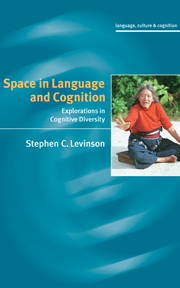Book contents
- Frontmatter
- Contents
- List of figures
- List of tables
- Preface
- Acknowledgements
- 1 The intellectual background: two millennia of Western ideas about spatial thinking
- 2 Frames of reference
- 3 Linguistic diversity
- 4 Absolute minds: glimpses into two cultures
- 5 Diversity in mind: methods and results from a cross-linguistic sample
- 6 Beyond language: frames of reference in wayfinding and pointing
- 7 Language and thought
- Notes
- List of references
- Language index
- Author index
- Subject index
4 - Absolute minds: glimpses into two cultures
Published online by Cambridge University Press: 03 December 2009
- Frontmatter
- Contents
- List of figures
- List of tables
- Preface
- Acknowledgements
- 1 The intellectual background: two millennia of Western ideas about spatial thinking
- 2 Frames of reference
- 3 Linguistic diversity
- 4 Absolute minds: glimpses into two cultures
- 5 Diversity in mind: methods and results from a cross-linguistic sample
- 6 Beyond language: frames of reference in wayfinding and pointing
- 7 Language and thought
- Notes
- List of references
- Language index
- Author index
- Subject index
Summary
In this book, the opposition between systems based on relative and absolute coordinates plays a major role. One pole of this opposition is familiar: we live in a culture in which relative coordinates organize most of our more self-aware spatial behaviour. This dependence on directions based on viewer-centred left vs. right is built into our cultural Corballis has put it). But the other pole of the opposition, cultures that organize things in absolute coordinates, is altogether less familiar, and in this chapter I try to bring this less familiar alternative world to life, by providing details from two such ‘absolute’ communities in which I have been fortunate enough to have had the opportunity to work.
In Chapter 2 we were concerned with how frames of reference can be correlated across different kinds of mental representations, and it was argued that one can distinguish the same three types of reference frame, intrinsic, relative and absolute, across the different perceptual modalities and their internal representations. In this chapter, I will produce the first evidence for a tendency for individuals to specialize their frames of reference towards the relative or the absolute across all these different kinds of representation. That is, it seems that individuals prefer to use just one frame of reference across modalities, for example across language, nonverbal communication media like gesture, non-linguistic spatial memory, and spatial reasoning.
- Type
- Chapter
- Information
- Space in Language and CognitionExplorations in Cognitive Diversity, pp. 112 - 169Publisher: Cambridge University PressPrint publication year: 2003



